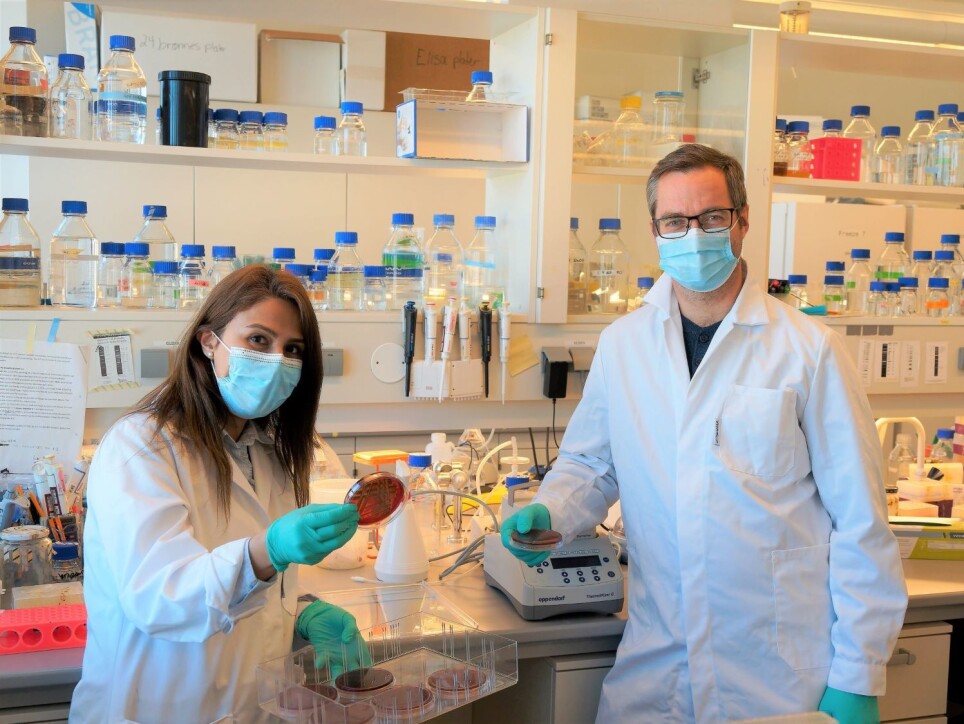THIS ARTICLE/PRESS RELEASE IS PAID FOR AND PRESENTED BY the Norwegian University of Life Sciences (NMBU) - read more

Bacteria use enzymes to defuse the immune system
Bacteria that make you ill, can hide from your immune system. They use enzymes discovered by Norwegian researchers ten years ago to defuse an important part of our immune response.
These enzymes are of use to bacteria in two very different ways: to obtain food and to protect them from your body’s immune system. Dr. Fatemeh Askarian at NMBU has discovered that these enzymes promote the ability of multi-drug resistance bacteria to overcome the host defence and make us sicker!
Discovered at NMBU
Askarian’s research partner is the one who discovered these mysterious proteins. “The story began eleven years ago when I discovered these enzymes,” says NMBU professor Gustav Vaaje-Kolstad. This discovery revolutionised what we know about how carbohydrates, for example cellulose, are broken down in nature.
The enzymes are called LPMOs, which stands for ‘lytic polysaccharide monooxygenases’.
“The LPMO enzymes are small molecular machines that chop up carbohydrate chains (polysaccharides). In cellulose, the enzymes cut the long chains into small sugar molecules. The sugar from the cellulose becomes food for the bacteria and fungi,” Vaaje-Kolstad explains.

Bacteria became resistance to immune system
Despite several indications in the literature, the potential roles of LPMOs in bacterial pathogenesis has remained ambiguous. With her expertise in host-pathogen interactions, Dr. Fatemeh Askarian was recruited to NMBU to launch the project. “By reviewing the scientific literature, we had found that LPMOs were present in several pathogens and that they were expressed when the bacteria came in contact with tissue or body fluids. This gave us the idea of examining whether the LPMOs could help the bacterium to survive better over the course of infection,” Fatemeh Askarian explains.
Multi-drug resistant bacteria
Askarian and Vaaje-Kolstad devoted their attention to the highly conserved and prevalent LPMO in one of the top priority human multi-drug resistance pathogens, Pseudomonas aeruginosa. The bacterium is a major cause of lung infections, particularly in patients with cystic fibrosis. The bacterium has also recently been associated with bacterial lung co-infection in COVID-19 patients. “Pseudomonas aeruginosa uses the LPMO enzymes to promote bacterial survival during septicemia or bloodstream- and lung infections by reducing the effect of an important part of the immune system,” says Fatemeh Askarian.
“We thought that these enzymes were only important in carbohydrate degradation, but thanks to the fantastic work of Fatemeh and our multidisciplinary collaborators, we have found out how central they are to infections,” says Gustav Vaaje-Kolstad.

In several bacteria
The LPMO enzymes can be found in many pathogenic bacteria. The researchers hope that Dr. Askarian and co-workers’s findings may contribute to the development of novel anti-virulence therapies to combat multi-drug resistant bacteria in future. To that end, the NMBU researchers and their partners have published an article about their findings in the highly reputed journal Nature Communications. “We have only published a small part of our data so far. Many of our findings just lead to new questions, so we keep working to find more answers that can solve the mysteries of LPMOs,” Askarian and Vaaje-Kolstad conclude. The project was funded in part by the Norwegian Research Council and the Faculty of Chemistry, Biotechnology and Food Science (KBM), NMBU.
References:
Fatemeh Askarian et.al.: The lytic polysaccharide monooxygenase CbpD promotes Pseudomonas aeruginosa virulence in systemic infection. Nature Communications, 2021.
Fatemeh Askarian et.al.: Behind the paper-When a popular industrial enzyme promotes bacterial virulence, Nature Microbiology Community, 2021.
Gustav Vaaje-Kolstad et.al.: An oxidative enzyme boosting the enzymatic conversion of recalcitrant polysaccharides. Science, 2010. (Summary)
———
Read the Norwegian version of this article at forskning.no
See more content from NMBU:
-
Shopping centres contribute to better health and quality of life
-
We're eating more cashew nuts – and the consequences are serious
-
Do young people with immigrant parents have better health?
-
Who’s picking your strawberries this summer?
-
Can coffee grounds and eggshells be turned into fuel?
-
Rising housing costs fuel inequality in Norway





































